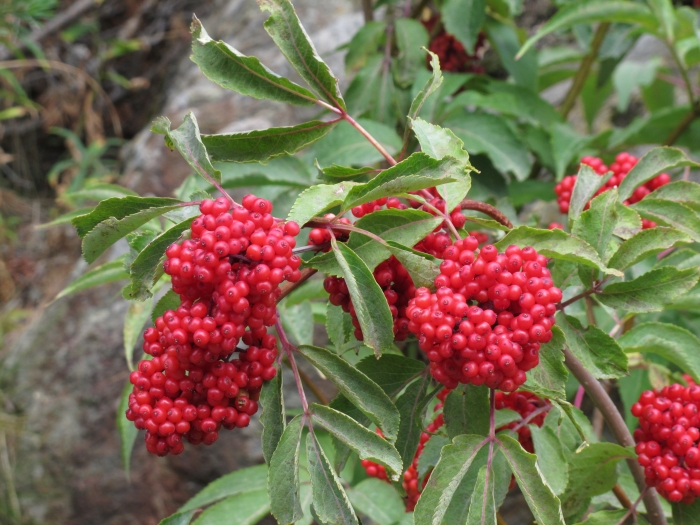Red Elderberry
(Sambucus racemosa)
Red Elderberry (Sambucus racemosa)
/
/

Robert Flogaus-Faust
CC BY 4.0
































































































Estimated Native Range
Summary
Red Elderberry is recognized for its clusters of cream and white flowers that bloom in late spring to early summer, followed by bright red berries that are attractive to birds and other wildlife. The flowers are moderately showy and can add ornamental value to gardens. It is often used in traditional and wildlife gardens, as well as in natural landscape designs, where it can serve as a focal point or naturalized planting. Red Elderberry prefers full sun to part shade and adapts well to a range of soil types, provided they have medium to fast drainage. It requires medium to high amounts of water, especially when establishing or during dry periods. While the plant is generally easy to maintain, it can be susceptible to various diseases such as powdery mildew and can spread aggressively if not managed. Gardeners should be aware of its potential to self-seed and spread beyond the desired area.CC BY-SA 4.0
Plant Description
- Plant Type: Shrub
- Height: 8-12 feet
- Width: 8-15 feet
- Growth Rate: Moderate
- Flower Color: Cream, White
- Flowering Season: Spring
- Leaf Retention: Deciduous
Growth Requirements
- Sun: Full Sun, Part Shade
- Water: Medium, High
- Drainage: Fast, Medium
Common Uses
Bee Garden, Bird Garden, Border Plant, Butterfly Garden, Deer Resistant, Edible*Disclaimer: Easyscape's listed plant edibility is for informational use. Always verify the safety and proper identification of any plant before consumption., Fragrant, Hummingbird Garden, Low Maintenance, Rabbit Resistant, Salt Tolerant, Showy Flowers, Water Garden
Natural Habitat
Moist, well-drained soils in open woodlands, forest edges, and riparian zones across parts of Europe and North America
Other Names
Common Names: Red-Berried Elder , Red-Berry Elder , European Red Elder , European Red Elderberry , Drue-Hyld , Roter Holunder , Trauben-Holunder , Sureau À Grappes , Trosvlier , Druvfläder , Druvhyll
Scientific Names: Sambucus racemosa , Sambucus racemosa var. plumosa , Sambucus borealis , Sambucus racemosa f. rosiflora , Sambucus buergeriana var. glabra , Sambucus praecox , Sambucus racemosa f. roseiflora , Sambucus racemosa var. laciniata , Sambucus roseiflora , Sambucus sieboldiana var. aurantiaca
GBIF Accepted Name: Sambucus racemosa L.